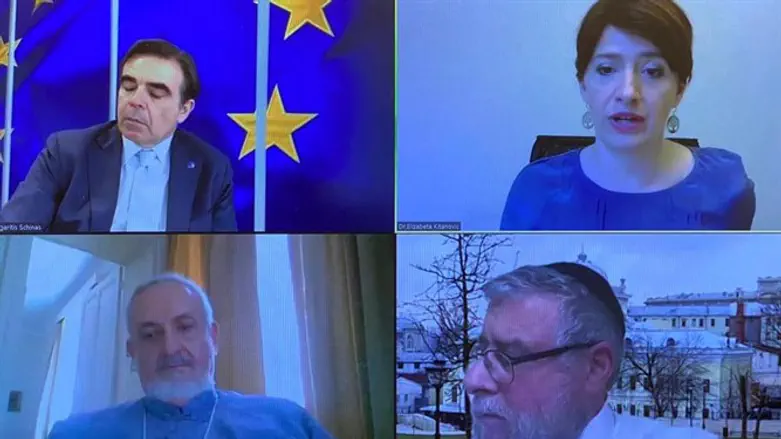
The G20 Interfaith Forum, the world’s leading organisation focused on bringing faith and policy together, hosted its first European regional virtual meeting today, kicking off a series of regional meetings that will produce policy recommendations for the formal G20 Interfaith Forum to be held in Riyadh, Saudi Arabia, Oct. 13 to 15. The gathering brought together a set of European expert working groups and leading religious actors, government officials, academic experts and business leaders who have been charged by G20 Interfaith Forum organizers with developing policy recommendations that will be submitted in November to world leaders at this year’s G20 Summit.
European Commission Vice-President for Promoting Our European Way of Life Margaritis Schinas said: “The admirable examples of solidarity we have witnessed during the pandemic should not be limited to crisis times but also be part of our future policies. This spirit of solidarity is certainly present at the European level and the European Commission considers it is an essential component of its post-crisis strategy. Through our structured dialogue we will continue focusing on issues which relate to the core values and ethical concerns and which should be at the heart of EU policies. We will ensure that they are built into our action, not remain empty words.”
Metropolitan Emmanuel of France issued a broad call to action on behalf of all participants for meaningful contributions from faith, government and business leaders to the G20 process and outlined avenues for developing meaningful substantive policy recommendations. He outlined the three ad hoc working groups that will be developing substantive recommendations over coming weeks on (1) Empowering People and Fostering Gender Equality, (2) Religious Engagement with Safeguarding the Planet; and (3) Frontiers at the Intersection of Governance, Faith, and Technology. He also joined two other prominent European religious leaders in a panel discussion moderated by Dr. Elizabeta Kitanovic from the Conference of European Churches who is member of the Executive Committee of the G20 Interfaith Forum Advisory Council, to address key themes emerging in concert with this year’s G20 priorities.
President of the Conference of European Rabbis, Chief Rabbi Pinchas Goldschmidt, raised the issue of freedom of religion or belief in European context in light of a challenge to a Belgian ban on ritual slaughter pending before the European Court of Justice, and the importance of European Institutions providing strong protections of the fundamental right to freedom of religion or belief in the first address. He said: “This issue needs to be discussed within future G20 Interfaith Forum meetings to ensure that there is legal protection of religious freedom or belief for all.”
Metropolitan Emmanuel of France addressed policy recommendations regarding the environment that need to focus among other things on food waste. “Food waste is without doubt one of the most incongruous challenges of our time,” he said. “I am encouraged to note that the European Commission has made reducing food loss and waste one of the pillars of its newly adopted strategy on addressing the challenges of sustainable food systems. This needs to be reflected on the political agenda of the G20 Summit.”
Grand Mufti Nedžad Grabus of the Islamic Community in Slovenia said: “The governing principle for relations between Muslim communities and the rest of European society is intercultural respect and understanding. Whether new arrivals or longstanding citizens, many Muslims struggle with negative narratives, prejudices and misunderstandings. European Muslim communities must increase their ability to teach children in a European context so that they are able to critically discuss and articulate their convictions as part of modern European discourse”.
The Brussels gathering launches a series of interactive webinars that will be conducted by commissioned working groups focused on issues linked to the G20 Summit priorities. Each will gather inputs on key themes from experts and a broader circle of stakeholders over the next several weeks, culminating in recommendations that will be submitted to the G20 Summit through the G20 Interfaith Forum process.
“These European interfaith initiatives provide a vital model for similar initiatives going on in other parts of the world—in the Middle East, Latin America, North America, Africa and Asia. They will address an array of issues including inequality, racism and discrimination,” said Professor Cole Durham, President of the G20 Interfaith Forum Association and Founding Director of the International Center for Law and Religion Studies. He added that the European Regional Consultations have particular significance because of the role of the EU and EU countries in the G20 process generally, and because of the strong channels of cooperation and engagement between religious communities and the public sector in Europe.
Dr. Elizabeta Kitanovic, moderator of the event, joined Professor Durham in specifying the important ongoing work in developing relevant policy recommendations. They were joined by key partners for this year’s G20 Interfaith Forum: the King Abdullah bin Abdulaziz International Centre for Interreligious and Intercultural Dialogue (KAICIID), the UN Alliance of Civilizations, and the National Committee for Interfaith and Intercultural Dialogue in Saudi Arabia.